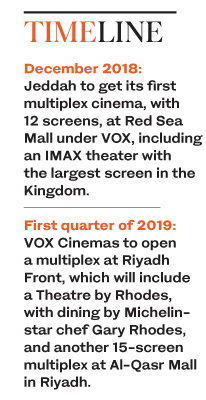DUBAI: With Riyadh movie-goers still facing sold-out screenings at the only two cinemas in Saudi Arabia after last April’s opening, movie operators granted admission to Gulf’s biggest market are preparing to feed their insatiable appetite for film.
Fans have flocked to the box-office since the first two theaters opened to the public in Riyadh, and not just to action movies. According to VOX, the region’s largest cinema operator, among the obvious big-screen hits, “Avengers: Infinity War” and “Black Panther,” have been the science fiction movies “Rampage,” starring Dwayne Johnson, and “A Quiet Place”, starring Emily Blunt, as well as the musical sequel “Mamma Mia! Here We Go Again.”
“There is a huge demand for entertainment in Saudi,” said Cameron Mitchell, CEO of Majid Al-Futtaim Cinemas, of which VOX Cinemas is a subsidiary. “The market is massive and full of opportunities as the population is young and enthusiastic about cinema and movies.”
As well as the blockbuster hits, Mitchell revealed that the first Bollywood movie to screen in Saudi Arabia, “Gold,” a historical drama about India’s hockey team at the 1948 Olympics, also attracted a host of fans to the box office.
But what can we expect before the end of 2018 as movie operators look to cash in on huge projected box-office returns?
Mitchell spoke with Arab News about his company’s plans over the next year, including the launch of a new cinema for residents in Jeddah within the next few months.
He said the Kingdom will form half of its overall revenues in the Middle East over the next five years as it unveils plans to open 80 new screens over the next 12 months.
Within months of Saudi Arabia formally ending a 35-year long ban on cinemas, three cinema operation licenses was awarded to operate in the Kingdom; the first was to AMC Theatres, an American chain owned and operated by Wanda Group, which opened the Kingdom’s first cinema on April 18 and plans to open 40 across Saudi Arabia over the next five years. Shortly after, the second license was awarded to VOX.
In July, it was announced the third license had been awarded to the Al-Rashed United Group — Empire Cinema, which plans to build 30 theaters in the country over the next three years. And last month, a fourth license was awarded to Lux Entertainment Co., which plans to open 300 cinemas across the Kingdom within five years.
Mitchell says the previously untapped market spells out a huge business opportunity for VOX. “Our plan is to roll out 600 screens across Saudi Arabia during the next five years and more than 600 screens by 2023,” he outlined. “This is the same amount of screens as our regional footprint combined.”
Majid Al-Futtaim will invest SR2 billion to open the 600 screens and will provide 3,000 jobs in the next five years to help achieve the goals of the Kingdom’s Vision 2030 when it comes to diversifying the economy and local production.
While Mitchell said he cannot disclose how much VOX anticipates to generate in cinema revenue on a yearly basis as it rolls out its expansion plans, he did say the Kingdom now forms an integral part of its business in the Middle East.
“Our estimate is that Saudi will form 50 percent of our business, and the return on our investment is likely to take the least amount of time, hopefully months as opposed to years,” he said. “We know the region; we serve Saudi guests through our offerings in other countries, so we know what will appeal to them.”
Majid Al-Futtaim opened it first four-screen movie theater in the Kingdom in Riyadh Park Mall as part of the largest Magic Planet Family Entertainment Center in the region in April. Mitchell said two more theatres will soon follow.
“We have announced the opening of our first multiplex in Red Sea Mall, Jeddah by the end of 2018,” he said. “This will include the largest IMAX screen in KSA and 12 screens of our signature experiences.
“We have also unveiled plans for our integrated cinema multiplex in Riyadh Front scheduled to open in 2019. By Q1 2019, our plan is to have nearly 80 screens in Saudi. This will boost employment opportunities for Saudis and continue to attract movie fans across KSA. We will be announcing our plans in due course with more information on the locations across the Kingdom.”
The Riyadh Front multiplex, which will be the largest in the Kingdom, will include VOX Cinemas’ signature experiences to the Kingdom, including the mega-screen Max, Kids and the luxury cinema concept Theatre by Rhodes, which means movie-lovers in Saudi Arabia will soon have the option of enjoying their favorite blockbusters while dining on an exclusive menu created by Michelin-starred chef Gary Rhodes.
With 35 cinema complexes in eight countries in the Mena region, VOX Cinemas is already well known to Saudi movie fans, said Mitchell.
“We know what will appeal to Saudi audiences as we have been welcoming them for many years in our Bahrain, UAE and other regional locations. Saudi has huge opportunities and is expected to become a significant box office market, worth $1 billion (SR3.75 billion).
“Saudi is one of the largest markets and is very promising. Saudi is not only a market for cinema, but also a place to drive wider businesses and encourage Saudi and GCC talent. Hence, it will contribute to the economy as well as the culture in Saudi.”
 Majid Al-Futtaim plans to invest SR16 billion ($4.2 billion) across its portfolio of shopping malls, fashion, leisure and retail projects in the Kingdom, and this latest project is expected to create more than 117,000 direct and indirect job opportunities, as the VOX Cinemas investment alone will see the company open 600 screens in the next five years in Saudi Arabia.
Majid Al-Futtaim plans to invest SR16 billion ($4.2 billion) across its portfolio of shopping malls, fashion, leisure and retail projects in the Kingdom, and this latest project is expected to create more than 117,000 direct and indirect job opportunities, as the VOX Cinemas investment alone will see the company open 600 screens in the next five years in Saudi Arabia.
The company has a considerable and expanding presence in Saudi Arabia with more than SR14 billion invested in current and announced projects across retail, leisure and fashion, creating more than 114,000 direct and indirect job opportunities.
“In addition, VOX Cinemas is investing an additional SR2 billion to open 600 screens in the next five years. In total, Majid Al-Futtaim has committed SR16 billion. This is an indication of the opportunities we see in Saudi.”
Movie-goers will also soon see new screen options from AMC, which was awarded the first license of its kind by the Saudi Ministry of Culture and Information to operate cinemas in the Kingdom.
Together with the Development and Investment Entertainment Company, the wholly owned subsidiary of the Public Investment Fund of Saudi Arabia (PIF), AMC plans to open around 40 cinemas in 15 cities in Saudi Arabia over the next five years and between 50 to 100 cinemas in about 25 cities by 2030.
AMC’s first movie theatre opened in Riyadh on April 18.
Adam Aron, CEO of AMC, previously said the company is following the creative movement of development projects in the Kingdom to open new economic sectors.
“We are looking forward to providing entertainment services that will enable everyone to spend an enjoyable time playing world-class film shows across the Kingdom,” he said.



































